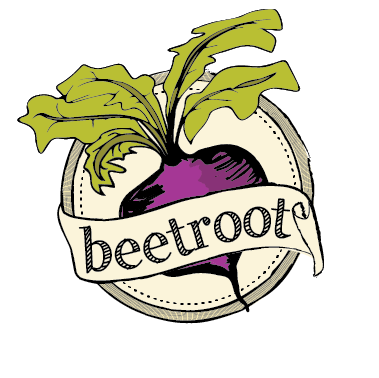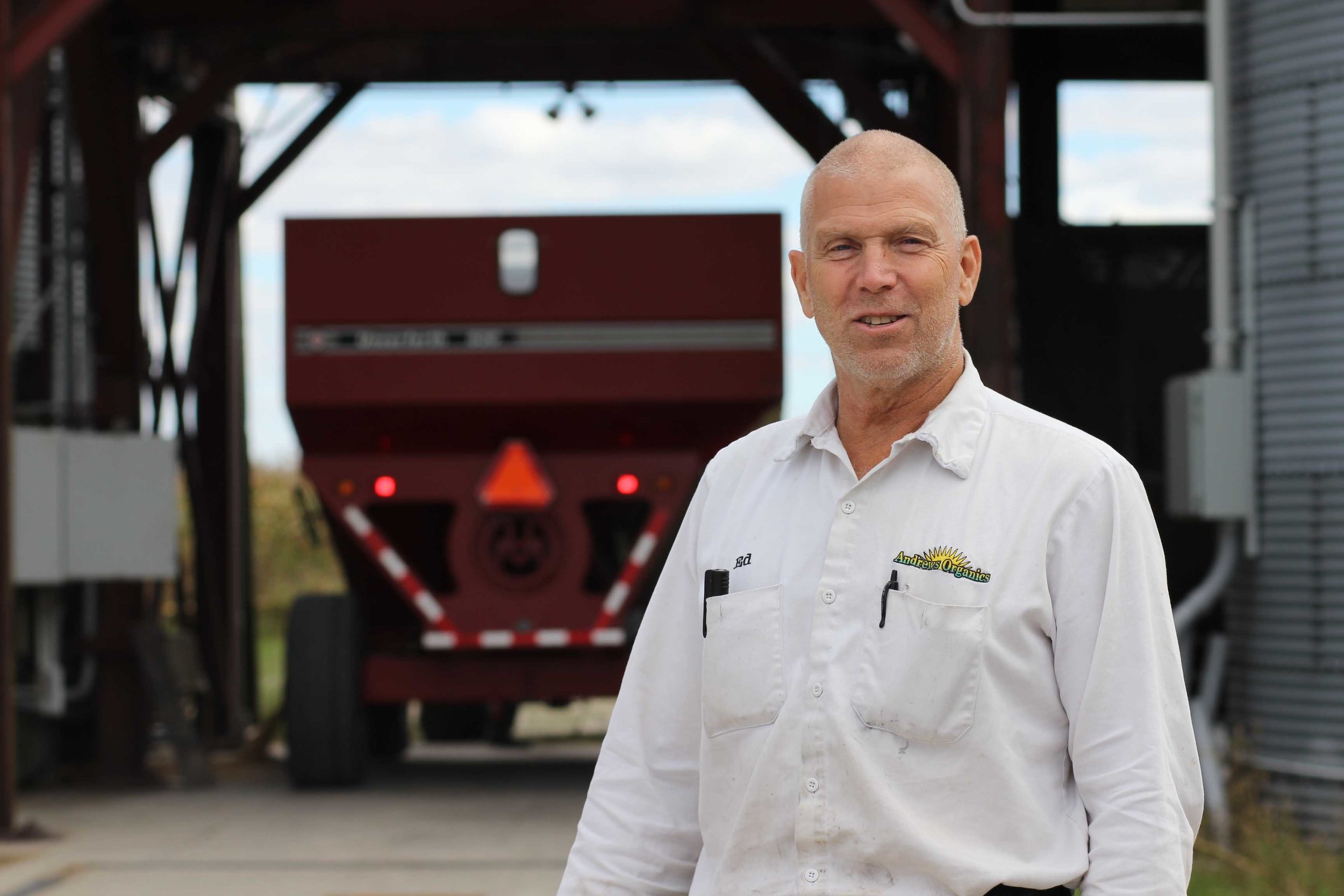Andrews Organics
From conventional to organic, work that pays off
Farm Specs
- Established in late 1940's
- Staff: 4 full time year-round, adds 2 part-time in summer season
- Crops: wheat, field corn, sweet corn, popcorn, black beans, pinto beans, soybeans
- 1200 acres; most owned & some rented
I have a lot of interest in the conversion process to organic farming because I come from a conventional family farm (my grandfather’s in West Unity), and I now live on a conventional farm (my husband's family farm). And you all know I'd prefer less chemicals and getting back to the way food was 100 years ago. I'd much prefer my son to be outside and not have to be concerned about if the field around the corner is being sprayed today. If we can achieve great yields without using chemicals and get paid more, isn't everyone winning? Now, this conversion story isn't about a farmer that is a healthy foods crusader; he's not passionate about cleaning up the food supply or ridding it of GMO's. And that's okay - he can convert simply for the reason of profit and everyone still wins.
see my concerns about chemical farming at the end of the post
“If we can achieve great yields without using chemicals and get paid more, isn’t everyone winning?”
Ed is the kind of guy that works until he's dog-tired. Planting fields in the middle of the night is nothing new for him, like many of the farmers I know. A die-hard work ethic seems to be in farmers' blood. He is the fourth generation of his family farm and in the 2000's, after working on the farm for 40+ years, he still found himself spending hours trying to figure out how to make the farm's income sustainable... working numbers up and down to find a solution to go beyond just paying the bills.
Ed heard of a local farming buddy in Grover Hill in the late 1980's getting $20/bushel for his organic soybeans, which was astounding. (current soybean prices are $18/organic and $9.19/ conventional). That piqued his interest. He met other farmers that were getting paid very handsomely for their organic crops, before it was really even a buzzword. After asking around and checking out some local operations, Ed decided to try converting 40 acres to organic in 2000. In 2003, he had the first harvest out of those acres and organic corn was selling for $4.55/bushel! Conventional was selling for less than $2/ bushel. He thought more than 100% increase was worth the hoops he had to jump through for certification. From there, Ed converted acreage every year. Now, 2018 will be his first year with ALL organic fields - all 1200 acres.
The interview
By way of Beetroot fashion, I thought it was time to ask Ed my slew of interview questions I had been thinking of for the last 3 months, anticipating our meeting. He was very helpful, honest, and gave me his undivided attention while I interviewed him. (I figured I would have had to have my laptop in the cab of a combine during this, following him around while he did work).
The Money
Let's get right down to it, here. How much more are you getting for your organic crops?
Well, two examples are: $18/bushel of soybeans (Conventional soybeans have been going for about $9/bushel)
$10/9.50/bushel of corn; sometimes they were getting $12 in the past (Conventional corn has been going for about $3.30/bushel this year)
Was there a transition period where you lost money?
No, but there were some years in the transition I did not make money, but knowing what I do now, I think I could do it all over again and not have that. I can help someone transition better now that I've been through it. But that was all still worth it.
Was there a large up front cost in the conversion
No, but there's an annual fee (over $1,000) plus about 1/2% of whatever we sell that's organic, which goes to our organic certifier.
“If we want twice the money, we have to be up to the challenge”
The Product
What do you farm?
Wheat, field corn, sweet corn, popcorn, black beans, pinto beans, soybeans
What do you like about being an organic farmer?
Besides the obvious increase in revenue, it's a specialty niche market and we produce a higher quality product. I like that, making the highest quality product we possibly can.
Who do you sell to?
Brokers; a lot of corn goes to poultry feed. But we'd love to sell to end consumers if the demand was there.
Tell me about the chemicals you used to use before.
I don't have any problem with chemical farming, but I did used to tell my dad to "save the spraying for me when I get home from school" - fearing the spraying was impacting his health in a very negative way. I've seen the spraying debilitate people.
“I did used to tell my dad to “save the spraying for me when I get home from school””
The Conversion Process
How did you know all the steps to convert?
OCIA (an organic certifier) got me hooked into a network and I started going to meetings to learn the ins and outs of the organic practices.
What were the toughest parts about the conversion?
a. The mound of paperwork to become certified; we had a staff person dedicated just to that for a while.
b. Cleaning all equipment to use between the conventional fields & organic. We had to clean and wash every nook and cranny of each tractor and combine, even wash the tires.
c. Learning weed management with organic herbicides and pesticides (neem oil, garlic oil, etc) as well as hand-weeding (of which we spent $60,000 in hand weeding one year.. something I've never done again - it's all lessons learned)
d. Creating 25 ft buffer zones around all crops; it was tough to carve out that space from roads and homes.
e. We spend a lot of time monitoring our fields for over-spray from other farmers. It's something we have to be very vigilant about or we'll get in trouble with our certifier. They take it very seriously. We have to be totally transparent & document it if there's over-spray.
What if Joe down the road wants to convert... what would you tell him?
It's NOT EASY!!! It's VERY HARD!!! Most people go broke or almost go broke when they switch. You've got to be on your toes and kill the weeds right away to be successful. It's not like conventional - when it's time to go, you gotta go. When you need to spray, you gotta spray. Time is of the essence.
Ed did note that if you have CRP acres (idle acres) those are the easiest to convert, but he is confident you can convert efficiently while still utilizing your land. He has a lot of tips & tricks to offer other conventional farmers out there and welcomes you to contact him (ed@andrewsorganics.com)...especially during the winter!
Noteworthy Conversion Facts
- You don't have to leave your land sit in order to convert to organic and you don't have to convert all of your land at once
- Your certification fees mostly come out of your selling price of crops; not in lump sum payments
- There are numerous organic certifiers you can choose to go through
- Having enough farm equipment to farm organic fields and separately enough to farm conventional is the easiest route to convert, otherwise you have to clean your equipment in between and it's very very time consuming - that was one hurdle Ed frequently had to jump.
My concerns with GMOs and chemical farming
- Glysophate (the active ingredient in Roundup) was patented as a broad spectrum antibiotic in 2000 (Monsanto even confirms that on their page here)
- In March 2015, the World Health Organization determined that the herbicide glyphosate (the key ingredient in Roundup®) is “probably carcinogenic to humans.”
- On that note, glysophate drives down into the seed of the plant, so it can't be washed off
- The claim of higher yields on GM crops has not been proven true. The comparison of U.S. GM corn to European non-GM corn from 1986- 2011 showed slightly lower yields. See here
- GMO's are banned in over 20 other countries (including: Switzerland, Australia, Austria, China, India, France, Germany, etc) but the U.S. decided they were Generally Recognized as Safe (GRAS) when it allowed them into the farming and food system.
- The evidence showing the "safety" of GMOs has largely been conducted by the companies that created them, not to mention, because we do not mandate GMO labeling in the U.S., it would be extremely hard to track the public health effects. But the health of the U.S. is in dire condition, as we all know.
But all facts aside, I just feel deep in my gut that farming has strayed far from what it was intended to be. I often look out across the field from our house and I try to imagine what my husband's great-grandfather was doing - utilizing unadulterated soil to grow real food. Over 80% of homes buy organic products and Americans spent $47B last year in organics. The demand and reward is there for our farm lands to return to what they once were.
Thanks for reading. I hope you enjoyed it.
- Beetroot Brooke









